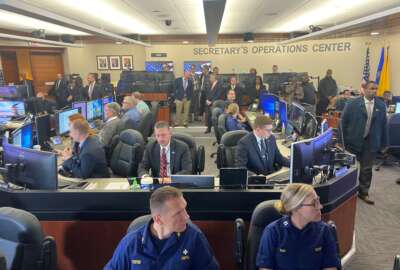
DHS closes Washington facility, orders telework for employees amid coronavirus outbreak
Department of Homeland Security employees who work at a shuttered federal facility in Washington state must self-quarantine and telework for 14 days amid a...
The Department of Homeland Security has closed one its facilities in Washington state and directed all employees to telework for two weeks in response to the growing threat of coronavirus in the area.
Acting DHS Secretary Chad Wolf ordered the closure of a federal building in King County, Washington, which began today. The office will remain closed for 14 days, and its employees have been directed to self-quarantine for two weeks, Wolf said.
The DHS building is being cleaned, he added.
The department made the decision to close the office Monday night after hearing from one of its employees at the Washington facility. The employee had visited a family member at the Life Care facility in Kirkland, Washington, the nursing home at the center of the outbreak in the state.
The visit occurred before it was known that the nursing facility had been impacted by the coronavirus, Wolf said.
“Though the employee did not report to work when they felt ill, we are taking these steps, again, out of an abundance of caution,” he told the House Homeland Security Committee Tuesday. “I am pleased to report that this employee embodied what it means to lead by example. The employee and their family took every precaution and followed the guidance of public health officials. They stayed home from work when they felt ill. The family self-quarantined and reported the exposure and their condition to their employers and other officials.”
It’s unclear how many DHS employees are self-quarantined — and whether all of them are eligible and prepared to telework.
“We ask those who are able to work, who perhaps aren’t showing symptoms and aren’t sick, if they’re able to telework, please do so,” Wolf said when asked for more details about the DHS employees and their working situations. “If you don’t have the ability to work or you haven’t gone through that certification process through the department, then you’re not going to telework. We’re not going to force you to telework in those cases.”
Employees who can’t telework for whatever reason will get paid for their time, Wolf said, though he wasn’t sure if they’d be compensated through paid sick leave or some other mechanism.
The Office of Personnel Management has said agencies may grant employees, who are subject to self-quarantine, weather and safety leave. The leave would apply to employees who aren’t eligible to telework but can’t safely work from their official duty stations, according to OPM’s February guidance.
Employees who are sick and quarantined can use accrued sick leave, according to OPM.
Wolf wouldn’t predict whether he’d order additional DHS closures due to the spread of the virus. Those decisions will come on a case-by-case basis, Wolf said.
DHS began sending messages to its employees about the possible spread of coronavirus in late January, Wolf said.
“As an employer, it is our utmost responsibility to protect our workforce,” he said. “In addition to the travel restrictions and enhanced medical screenings that we’ve put in place, DHS continually engages our workforce with guidance on protective and preventative measures.”
The department is giving its employees, especially Customs and Border Protection workers and transportation security officers who are on the front lines in high-traffic areas, training, guidance and protective gloves, masks and other gear.
Employees currently have the option of wearing protective gear on the job; it’s not a requirement, Wolf said. The department is working with DHS unions on further guidance and communication.
The department is part of an inter-agency team leading the federal government’s response to the coronavirus. A DHS rapid response team is working with the Centers for Disease Control and Prevention, as well as state and local officials, to manage and respond to the coronavirus.
Americans who travel from known coronavirus “hot spots” across the globe are being screened at 11 airports by CBP, at the direction and guidance of the CDC.
To date, DHS has screened more than 50,000 passengers for the virus, Wolf said. The Transportation Security Administration is working with the CDC to ensure individuals on the agency’s “do not fly” list aren’t placed on flights.
Members on the House Homeland Security Committee on Tuesday urged Wolf to generate a common, single message among inter-agency partners about the administration’s response to the coronavirus.
Sen. Gary Peters (D-Mich.), the ranking member on the Homeland Security and Governmental Affairs Committee, echoed those concerns. He urged Vice President Mike Pence to create a centralized website for information about the virus.
“This would allow Americans to find information on any aspect of the response — whether they own a small business, serve in our armed forces, work with children, are traveling internationally or develop treatments in a lab,” Peters wrote in a letter to Pence. “This effort would maximize public accessibility to trusted sources, combat the spread of misinformation and disinformation, strengthen coordination between agencies and support our communities nationwide as we respond to the virus.”
Copyright © 2025 Federal News Network. All rights reserved. This website is not intended for users located within the European Economic Area.
Nicole Ogrysko is a reporter for Federal News Network focusing on the federal workforce and federal pay and benefits.
Follow @nogryskoWFED
Related Stories





